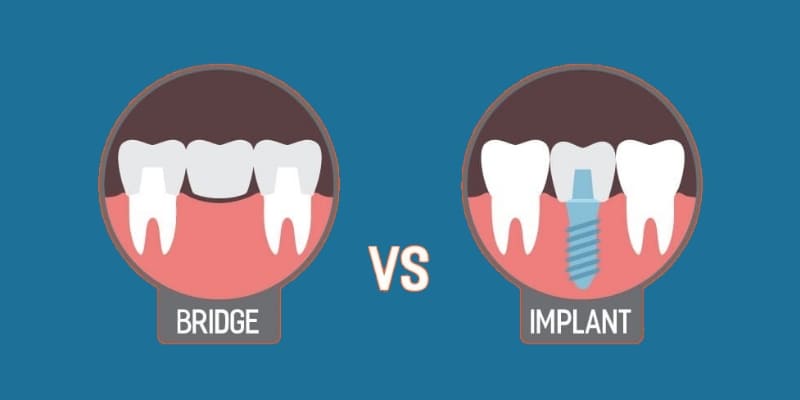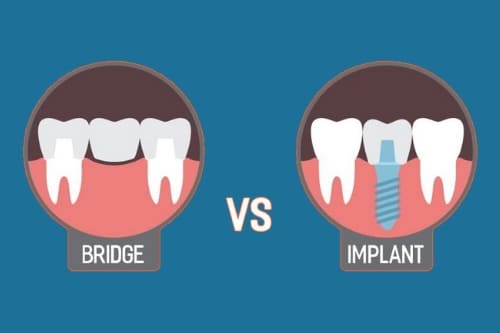I’m almost certain that most people aren’t aware of the many differences between dental implants and bridges.
Do you have a missing tooth? Are you planning on receiving cosmetic dental surgery soon?
If this sounds like you, then chances are that you’ve been looking at bridges and implants! But...you might not know whether a bridge or an implant is best for your needs. Don’t worry – throughout this article, we’ll take a look at the key differences between the two, along with a detailed list of pros and cons.
Let’s jump right in!

What Do They Do?
If you’re not familiar with bridges or implants, that’s ok! Both procedures are great ways to fill in missing or damaged teeth. Maybe you’ve recently had an extraction. Perhaps you’re about to have a tooth pulled. Either way, you might be worried about the empty space – especially if it’s in a visible part of your mouth!
The good news is that bridges and implants will both:
• Cover the gap naturally
• Blend in with your other teeth
• Look realistic
• Prevent the risk of infection
• Help to prevent further damage
The thing is…
Bridges and implants, despite serving the same purpose, work in very different ways:
Implants
Let’s start by looking at implants.
Teeth connect to your jaw via a root – this anchors them, keeping them firmly in place. A dental implant can recreate this: an artificial tooth ‘root’ is drilled into – and implanted – into your gums.It can be a long procedure, but don’t be discouraged – implants are incredibly durable and will last for a very long time.
Here’s how it works:
• An artificial root (made of titanium) is implanted
• A protective screw is placed on the implant
• The implant will fuse to your jaw bone within 6 months
• A temporary crown is put in place while the gums adapt
• Eventually, a permanent crown is put in place
Pros
• More permanent than a bridge
• More durable and secure
• Can last up to half a century!
Cons
• Can be more expensive than a bridge
• Requires drilling into your gum
• Long recovery time
Bridges
Now that we’ve investigated implants, we can take a look at bridges!
Instead of ‘implanting’ an artificial root, a bridge will rely on the strength of your other teeth to hold a crown in place. A bridge will ‘bridge the gap’ by utilising your existing jaw structure!
• Surrounding teeth will be altered to support a new crown
• A crown will be measured and fitted before being anchored to one (or more) of your other teeth
Pros
• Cheaper than implants
• Does not require drilling into the gum
• Quicker recovery time
Cons
• Will only last for up to 20 years
• Necessary alteration of your other teeth
• Less durable than an implant
• Can be affected by damage to other teeth
The Big Difference
In summary, it's important to know this simple fact; a dental bridge will likely last between 10 and 20 years before it must be replaced. If cared for properly, an implant can last 40 years or longer. So, an implant might cost you more time and money in the short term, but over the lifetime of your smile, it may actually save you both.
Dr. Fadi Raffoul
If you’re looking for more information on bridges and implants, or if you’d like to book a consultation, feel free to get in touch with us today.
You can contact us at (813) 684-7888 or fill out a contact form, and we’ll be glad to help in any way we can.






